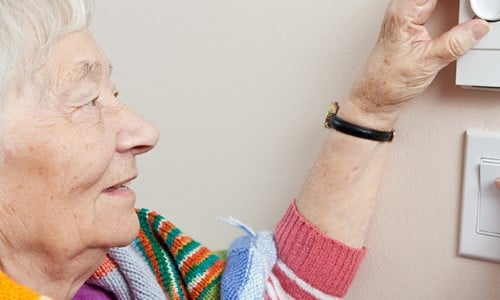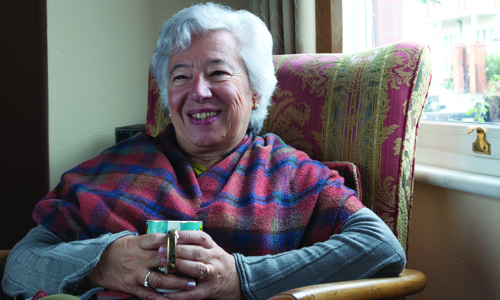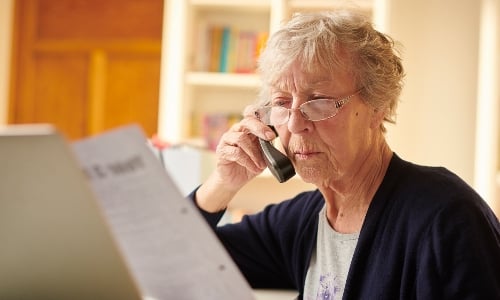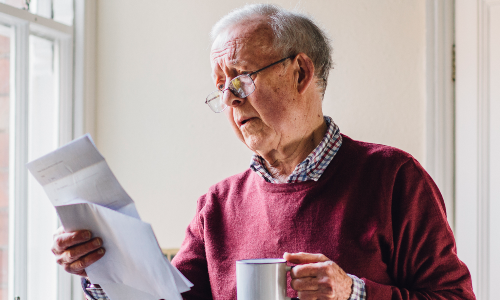The winter poses a number of challenges for older people. Severe weather conditions can pose a serious health risk but many older people struggle to heat their homes and stay healthy because of costly energy bills.
As a result, during the winter many older people have to make the choice between eating and putting their heating on.
Whether you’re an older person facing that decision yourself or you know someone that might be faced with that decision this winter, these important checks can help you or someone you know make sure they’re not missing out on any extra support.
We’ve put together some important checks that can help you or someone you know afford to stay well this winter.
1. Benefits and entitlements
Get a benefits check. Whether you already claim benefits or it’s something you’ve not really considered, it’s worth knowing exactly what you’re entitled to. Each year up to £3.5bn of Pension Credit and Housing Benefit goes unclaimed by older people. Age UK's free online Benefits Calculator helps make it easy to get an estimate of the benefits you could be entitled to. All you need is certain information, such as your savings information, income, pensions and any existing benefits (for you and, if applicable, your partner).
2. Additional help with heating costs
If you are 65 or over you could be entitled to a one-off Winter Fuel Payment from the Government of around £100-£300. These payments are made during November and December, so set a reminder for the end of 2020. To find out if you might meet the eligibility criteria, call the Government helpline on 0800 731 0160.
3. Cold weather payment when temperatures drop
When it’s particularly cold out (the temperature drops to zero for seven consecutive days), you could be entitled to an extra bit of money to help with the cost of heating your home.
A Cold Weather Payment of £25 for each seven-day spell can help those who are eligible to help with energy bills. To claim, you already need to be in receipt of certain benefits such as pension credit, income support, and universal credit (among others). This is payable by the Government and is only applicable between the months of November and March.
4. Warm home discount from suppliers
If you are with one of the larger energy providers and receive pension credit you could be entitled to a discount on your energy bills. The Government, provides certain large energy providers with a rebate, and the company then passes on a £140 reduction to their customers. This is available to certain customer groups, including older people, and is available from October to March.
To receive this discount it is essential that older people apply. It’s certainly worth checking if you’re eligible as receiving this discount does not affect any other benefits or allowances such as Winter Fuel Allowance, cold weather payments or any other winter payments.
Further advice in winter
Call the Age UK Advice Line on 0800 678 1602. The line is open 8am to 7pm, every day of the year. Or read our winter wrapped up guide for information on health, staying safe, and eating well.
5. Check you are getting the best deal from your energy supplier
Energy companies have more than one tariff so it is important that to check that you aren’t paying too much for your energy. Many people are on a standard tariff, which is unlikely to be the best or cheapest deal, meaning you could be over paying by hundreds of pounds a year. Sometimes an energy provider’s bills or statements will highlight some possible cheaper options, or you can call your supplier to ask directly. It is also possible that some companies will offer a cheaper tariff if you change the way you pay for your energy, such as paying online or via direct debit straight from your bank.
You may be able to save money by switching to a different supplier. Switching supplier doesn’t change the energy you receive at all, just who you pay for it, so there’s no need to change any pipes or cables. This also means you don’t need to worry about an interruption to your energy supply when switching.
6. Free insulation or heating improvements
If you receive certain benefits, including Pension Credit or Attendance Allowance, or live in social housing with a low energy efficiency rating, you may be able to get help under the Energy Company Obligation (ECO) scheme.
You may be able get insulation installed, or central heating if you don’t currently have it. If you own your home, you may be able to get a broken boiler repaired or replaced. Larger energy suppliers have to participate in ECO, but it doesn’t matter whether your supplier participates. You can apply to any supplier that takes part.
7. Free winter car check
Our general advice if there is a period of severe cold, snowy or icy conditions on the way is not to travel by car. But if you must travel by car, you may want to get a free winter car check before you go. Halfords offers this service. It takes 15 minutes and there is no need to book. They will check your car’s battery, headlight, brakes, wind screen wipers and tell you when your MOT is due.
If you don’t have a car and are feeling like braving the weather by bicycle, then they offer a similar service for your bike too.
8. Simple ways to save energy and cut costs
There are some simple things you can do to cut down your energy bills. Here are just a few:
- Run the washing machine at a lower temperature – you can often do everyday washes at 30°C. Washing clothes at 30°C uses around 40% less electricity over a year than washing at higher temperatures.
- Use your heating controls, such as thermostats and timers, to heat your home without wasting energy.
- Make sure you keep your living room (or the room you use most) warm during the day while you’re at home at 21°C (70°F) and heat your bedroom to 18°C (64°F) before you go to bed. If there are rooms you don’t use, like a spare bedroom, turn off the radiators in them and close the doors.
- Keep radiators and heaters clear so hot air can circulate. Don’t forget to draw your curtains and tuck them behind radiators to minimise heat loss.
- Make sure doors and windows are draught-proofed to avoid loss of heat. Fit draught-proofing strips and draught excluders around doors, sealing gaps around window frames and fitting covers to letterboxes and keyholes. This can save you around £25 a year.
- Double glazing reduces heat loss as well as noise from outside. You could save up to £80 per year in heating bills if you install it throughout your home. You can choose to double glaze the rooms you use and heat most often to keep installation costs down.
9. Grants from Energy supplier fund schemes and charitable trusts
Some energy suppliers have charitable trusts or funding schemes to help people in a time of crisis. Some are restricted to helping the supplier’s customers, while others are open to everyone.
The specific eligibility criteria and the help that is available varies from scheme to scheme, but you may get a boiler repair or replacement, help with energy debts or help to buy essential household items such as washing machines and cookers. The main schemes are:
- British Gas Energy Trust
- EDF Energy Trust
- npower Energy Fund
- npower Health Through Warmth Scheme
- E.ON Energy Fund
It is essential to speak to your supplier as soon as you can if you’re having difficulty paying your bills at any time of year, not just winter time. They'll let you know how they can help you avoid getting further into debt.








